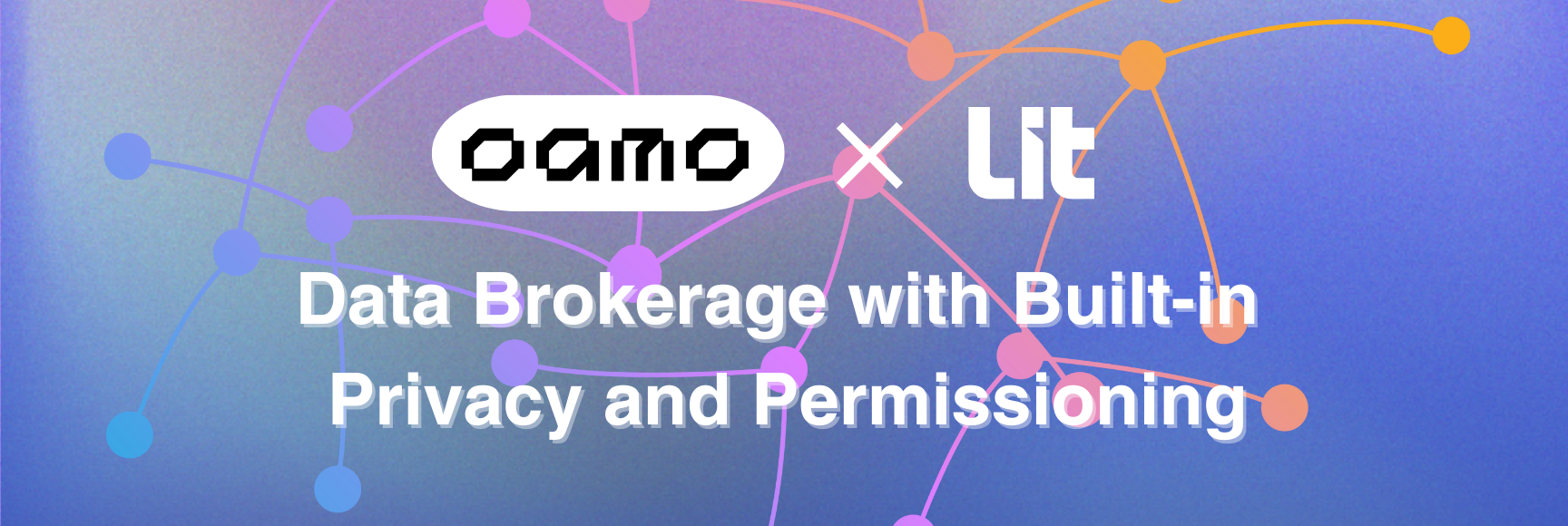Oamo x Lit: Data Brokerage with Built-in Privacy and Permissioning

In a digital world where users have increasingly become the product, Oamo is redefining power dynamics by providing a secure avenue for users to share their credentials with businesses via sophisticated data pools. These pools not only streamline the data collection process, but they also offer a higher level of security and privacy by aggregating and anonymizing data, ensuring that individual identities remain protected in the sea of digital information.
Leveraging the power of the Lit Protocol, Oamo provides an additional layer of data protection by encrypting and permissioning user data. This approach puts the keys to information in the hands of those it truly belongs to - the users themselves. With this control, users can dictate read and write permissions, giving them the ultimate say over their own digital identities.
Oamo
A decentralized data broker that allows individuals to own and monetize their data.
Users can share their on-chain and off-chain data anonymously with trusted companies in exchange for exclusive token rewards and promotions.
For businesses, Oamo enables access to high-quality leads, generates deep insights into user behavior, and allows the creation of personalized marketing campaigns. Their unique approach benefits both end users and businesses, as users receive offers that match their interests, and businesses can reach users who are likely to be interested in their products or services while preserving their privacy.
Fundamentals
Oamo aims to provide:
- a private and anonymized system for zero-party data transactions. This requires personal data permissioning and encryption so that users are truly in control of who can access their data while never revealing personally identifiable information to organizations.
- a way for companies to send personalized offers to users that leverages behaviors instead of personal information such as wallet addresses, usernames, or DIDs.
Data Privacy with Lit
Encrypting the messaging layer to hide user information is a fundamental component of our architecture that is powered by Lit. Lit enables the privatization and permissioning of user data in Oamo’s decentralized environment.
On Oamo, users create their decentralized identifiers (DIDs) using the Ceramic network. They can then connect multiple wallets and social profiles to their DID to build their data profile. Upon a new data source connection, Oamo scans the DID to generate credentials based on the user’s behavior, such as token holdings, smart contract activity, social activity, and demographic information. These credentials are then associated with the DID and stored in ComposeDB. The problem is that these credentials and data connections need to be private to preserve user privacy. Using Lit, users can encrypt their own data in order to control read and write permissions.
Users can share their credentials with companies (data buyers) via data pools that aggregate and anonymize the data collection process. Upon participating in a data pool, users grant temporary read access to the credentials to Oamo so they can be aggregated and leveraged in insights reports provided to the data buyers. This allows Oamo to provide valuable behavioral insights to data buyers without ever revealing personally identifiable information about users.
Once a user has participated in a data pool, the pool’s data buyer can send personalized offers (discounts, product news, surveys, giveaways) to participating users using a DID messaging sytem. Oamo uses Lit to encrypt the communication so that recipients information are hidden from the data buyer, creating a unique solution for anonymized personalized marketing.
Data Sovereignty
The adoption of the Lit is fundamental to the way Oamo handles user data and ensures stringent access controls. By leveraging Lit, Oamo eliminates the need to store sensitive user information in the database, granting data sovereignty to valued users.
The process begins with the creation of verifiable credentials for each user, empowering them to embark on a seamless journey of encrypting and organizing their personal identifiable information. Subsequently, there is a comprehensive list of access control permissions that enable a smart control system to access the data exclusively when a user requires verification and qualification for onboarding into a data pool.
Challenges
One of the major challenges Oamo encountered during development was ensuring a seamless user onboarding journey. Every interaction involving a crypto wallet requires a signature, which means that users have to sign multiple transactions throughout the onboarding process. This friction point makes dApps less user-friendly than web2 applications. However, through the implementation of a clever cryptographic technique, Oamo has successfully minimized the number of signature actions required by the user, resulting in a significant reduction in complexity and streamlining the overall user experience.
Future Plans
Oamo’s main focus is on improving the user experience around data connections and encryption. It currently takes multiple actions to add a wallet to a DID and then encrypt it. They aim to drive down the number of clicks and signatures to a minimum to ensure smooth onboarding to a private data economy.
Conclusion
User privacy on Oamo would not be possible without Lit. Oamo allows users to confidently build their data profile, build direct and anonymous relationships with companies, and receive personalized offers while preserving their privacy at all times.
Privacy is a key factor for both data buyers and users. Data buyers have voiced their concerns regarding the acquisition of personally identifiable information as it goes against their decentralization ethos. Oamo’s Lit integration allows data buyers to finally be able to understand and reach their audience without compromising their privacy, presenting a win-win situation for businesses and consumers.
